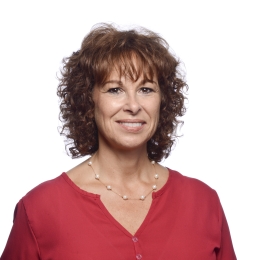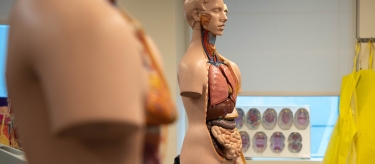
Communication Disorders M.S.
- 60 Credits
- School of Health and Natural Sciences
- Westchester

M.S. in Communication Disorders Overview
Gain the real-world experience you will need to pursue a career in the field of Communication Disorders.
There's a growing need for speech and language services. With more young children and seniors in need of services, the demand for speech-language pathologists is great. Mercy University's Master's Degree in Communication Disorders is a premier program in the metropolitan New York area. The 60-credit program fosters ethical, competent, autonomous practice.
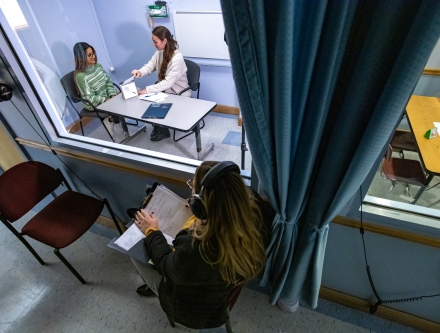
Career Opportunities
Speech language pathologists (SLPs) work to prevent, assess, diagnose and treat speech, language, social communication, cognitive-communication and swallowing disorders in newborn to geriatric individuals.
Employment facilities include schools, hospitals, clinics, long-term care facilities, rehabilitation centers, and private practice.
SLPS work with the full range of human communication and swallowing disorders in individuals of all ages:
- Evaluate and diagnose speech, language, communication and swallowing disorders
- Treat speech, language, communication and swallowing disorders
- Provide training and education to family/caregivers and other professionals
- Work collaboratively with professionals from many other disciplines
Join us for our Upcoming Graduate Events
Join us for an upcoming graduate admissions event to learn more about our MS in Communication Disorders program and explore how Mercy can help you meet your goals.
No GRE Requirement
At Mercy University, students are much more than a number on a standardized test, therefore the GRE is not required for admission into the Communication Disorders graduate program.
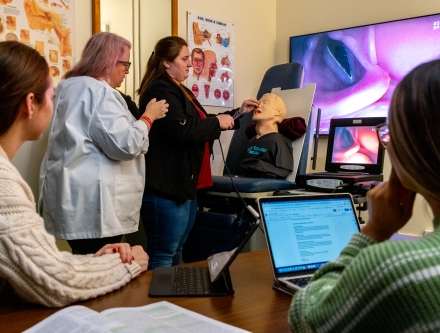
The Mercy Advantage
- Partnership with the New York City Department of Education Scholarship
- Campus based Speech and Hearing Center
- State-of-the-art Clinical Simulation lab used for interprofessional education
- Audiology and voice labs, endoscopy practice, access the Anatomage table
- Affiliations with over 250 facilities, including Montefiore Medical Centers and Northwell Healthcare
- Global mission trips
- All students participate in research
- TSSLD (Teacher of Students with Speech and Language Disabilities) certification
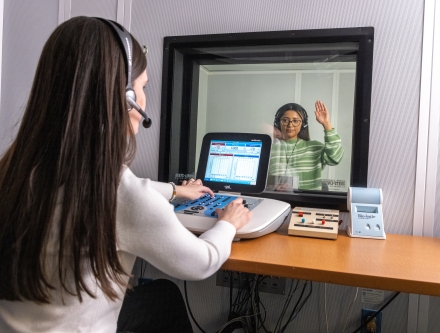
Mercy University Speech and Hearing Clinic
The Master of Science program in Communication Disorders has an invaluable training tool, our campus-based clinic offers students hands-on clinical learning supervised by licensed speech-language pathologists.
For more than 30 years, the Mercy University Speech and Hearing and Hearing Clinic has served the community. The Center offers comprehensive diagnostic evaluations and therapy for preschoolers, school-aged children, adolescents and adults.
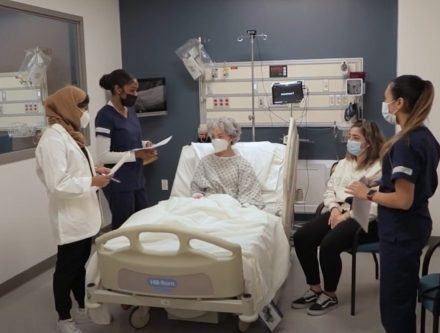
Interprofessional Education in Simulation Labs
Students from various health professions work with a simulated patient (a student actor from the University) in one of the simulation labs. These interprofessional experiences help students learn about other professions’ roles and responsibilities, values and ethics, and teamwork. These simulated experiences prepare them for their real-world clinical experiences.
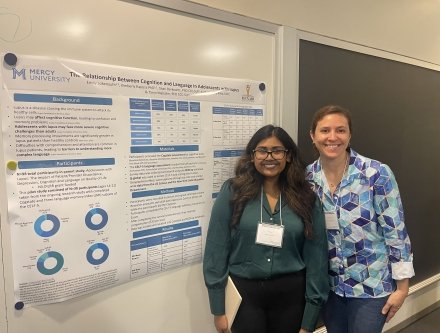
Student Research
Emily Lokenauth, an undergraduate Communication Disorders student, presented her at the CUNY Graduate Center Communication Disorders Student Research Day and received an award for her excellent presentation. Emily is a McNair Scholar and will be attending Mercy’s graduate Communication Disorders Program next year.
Want More Info?
We'd like to hear from you! Get more information.
How to Apply
Applicants for the Master's Degree program in Communication Disorders must apply through Communication Science and Disorders Centralized Application service (CSDAS) at https://csdcas.liaisoncas.com/applicant-ux/#/login
Application is open now. Application deadline is February 1, prior to the fall for which the student would begin the program.
Requirements for admission into the CD Master of Science Program include:
1. Transcripts for all undergraduate and graduate programs attended. Students who have studied at institutions of higher education in other countries must present original transcripts and official translations as part of the admissions submission. Mercy University Office of Admissions will make the final official evaluation of international transcripts; however, all students are required, at their own expense, to obtain an evaluation of their transcripts by a NACES (National Association of Credential Evaluation Services) certified evaluation agency (e.g., WES, SpanTran, ECE). Such evaluations should be sent by the agency directly to the Student Services Support Center at Mercy University. A complete list of NACES members can be found at www.naces.org.The criteria for accepting international degrees and credits are the same as that for degrees and credits from U.S. colleges and universities.
2. Bachelor's degree conferred by the spring term of the application process.
3. Minimum GPA of 3.0 for the applicant's Bachelor's degree. Applicants with a lower overall GPA may be considered for admission if their last two years of grades show steady improvement and meet the GPA minimum.
4. Minimum GPA of 3.0 in the six primary prerequisite courses. Only grades of "C" or better in the prerequisite course will be accepted.
5. In addition to completing the Prerequisites section of the CSDCAS application, applicants must complete the "Prerequisite Checklist"
The additional 5 courses (Aural Rehabilitation, Statistics, Social/Behavioral Science (e.g., Anthropology, Ethnic/Cultural Studies, Archaeology, Economics, Gender/Sexual Studies, Political Science, Psychology, Area Studies/Sociology, Criminology), Physical Science (Chemistry or Physics) and Human Biology) are not necessary for admission into the graduate program but must be completed before the end of the first year of graduate school. Only grades of "C" or better in these courses will be accepted.
6. Submission of a résumé
7. Oral Communication skills necessary to provide services to a wide range of clients
8. Adequate written communication skills
9. "Writing Sample" in response to the question, "All graduate students at Mercy University participate in research. Please think about an area of interest. Explain why this is of interest and include a rationale as to why you feel research in this area is important to the field of speech/language pathology." The statement is to be double-spaced in a font of 12 and no more than two type-written pages in length.
10. Completion and submission of application on CSDCAS.
11. Two letters of recommendation attesting to the applicant’s capacity to successfully complete graduate study are required. One letter of recommendation MUST be from a professor in the Department of Communication Disorders (CD). The second letter of recommendation may be from a professor in the CD Department or a related field (e.g., education, health sciences), an undergraduate clinical supervisor who has supervised the applicant’s planning, implementing, and documenting of speech/language therapy sessions, or a supervision from a related position (e.g., principals, supervisors, unit coordinators, rehabilitation directors, etc.). Letters from speech/language pathologists who the applicant has only observed or “shadowed” will NOT be accepted.
12. Submission of entire application packet is due by February 1 (Applications are accepted for fall admission only.)
13. Applicants whose native language is not English must submit scores for the Test of English as a Foreign Language (TOEFL). The minimum acceptable TOEFL score is 600. (The CSDCAS-wide TOEFL code is 122.)
Please note: if applicants are taking courses during the fall and spring semesters of the application process, it is very important that updated transcripts are submitted when final grades are available.
Any student interested in the Communications Disorder program must have at least four of the following six prerequisite courses completed for their application to be evaluated. All remaining prerequisite course-work must be completed by the end of the spring term prior to fall admission to enroll in the graduate program:
- Anatomy & Physiology of Speech & Hearing Mechanism (CMDS 256 – 4 crs.)
- Phonetics (CMDS 240 – 3 crs.)
- Speech & Hearing Science (CMDS 270 – 3 crs.)
- Introduction to Communication Disorders or Speech Pathology I (CMDS 258 – 3 crs.)
- Introduction to Audiology (CMDS 257 – 3 crs.)
- Normal Speech & Language Development (CMDS 264 – 3 crs.)
The following five courses are also recommended, but are not required in order to apply to the CD graduate program. Only grades of "C" or better in these courses will be accepted:
- Statistics* (BHSC 370 or MATH 122 – 3 crs.)
- Aural Rehabilitation* (CMDS 340 – 3 crs.)
- Physical Science** (Chemistry or Physics only)
- Biological Science** (Human Biology)
- Social/Behavioral Science** (e.g., Anthropology, Ethnic/Cultural Studies, Archaeology, Economics, Gender/Sexual Studies, Political Science, Psychology, Area Studies/Sociology, Criminology)
*Must be taken for undergraduate credit prior to or during first year of graduate study
**Required for ASHA Certification; must be completed by the end of the first year of graduate school
For more information, please contact the Admissions Office at 1-877-MERCY-GO or the Communication Disorders department at 914-674-7739.








